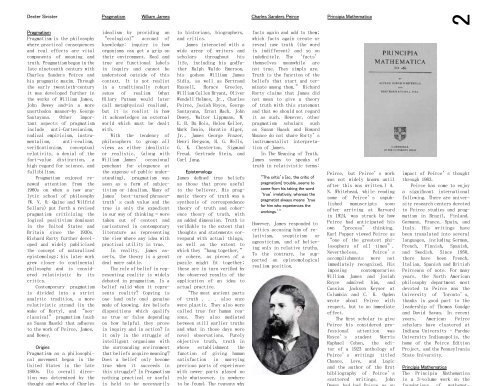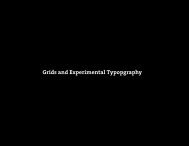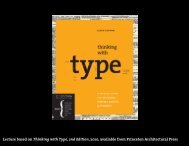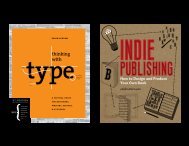Artists Books: How to Do Things with Typography - Thinking with Type
Artists Books: How to Do Things with Typography - Thinking with Type
Artists Books: How to Do Things with Typography - Thinking with Type
- No tags were found...
Create successful ePaper yourself
Turn your PDF publications into a flip-book with our unique Google optimized e-Paper software.
Dexter SinisterPragmatism William James Charles Sanders Peirce Principia Mathematica2PragmatismPragmatism is the philosophywhere practical consequencesand real effects are vitalcomponents of meaning andtruth. Pragmatism began in thelate nineteenth century <strong>with</strong>Charles Sanders Peirce andhis pragmatic maxim. Throughthe early twentieth-centuryit was developed further inthe works of William James,John Dewey and—in a moreunorthodox manner—by GeorgeSantayana. Other importantaspects of pragmatisminclude anti-Cartesianism,radical empiricism, instrumentalism,anti-realism,verificationism, conceptualrelativity, a denial of thefact-value distinction, ahigh regard for science, andfallibilism.Pragmatism enjoyed renewedattention from the1960s on when a new analyticschool of philosophy(W. V. O. Quine and WilfridSellars) put forth a revisedpragmatism criticizing thelogical positivism dominantin the United States andBritain since the 1930s.Richard Rorty further developedand widely publicizedthe concept of naturalizedepistemology; his later workgrew closer <strong>to</strong> continentalphilosophy and is consideredrelativistic by itscritics.Contemporary pragmatismis divided in<strong>to</strong> a strictanalytic tradition, a morerelativistic strand (in thewake of Rorty), and “neoclassical”pragmatism (suchas Susan Haack) that adheres<strong>to</strong> the work of Peirce, James,and Dewey.OriginsPragmatism as a philosophicalmovement began in theUnited States in the late1800s. Its overall directionwas determined by thethought and works of Charlesidealism by providing an“ecological” account ofknowledge: inquiry is howorganisms can get a grip ontheir environment. Real andtrue are functional labelsin inquiry and cannot beunders<strong>to</strong>od outside of thiscontext. It is not realistin a traditionally robustsense of realism (whatHilary Putnam would latercall metaphysical realism),but it is realist in howit acknowledges an externalworld which must be dealt<strong>with</strong>.With the tendency ofphilosophers <strong>to</strong> group allviews as either idealisticor realistic, (along <strong>with</strong>William James’ occasionalpenchant for eloquence atthe expense of public understanding),pragmatism wasseen as a form of subjectivismor idealism. Many ofJames’ best-turned phrases—truth’s cash value and thetrue is only the expedientin our way of thinking — weretaken out of context andcaricatured in contemporaryliterature as representingthe view where any idea <strong>with</strong>practical utility is true.In reality, James asserts,the theory is a greatdeal more subtle.The role of belief in representingreality is widelydebated in pragmatism. Is abelief valid when it representsreality? Copying isone (and only one) genuinemode of knowing. Are beliefsdispositions which qualifyas true or false dependingon how helpful they provein inquiry and in action? Isit only in the struggle ofintelligent organisms <strong>with</strong>the surrounding environmentthat beliefs acquire meaning?<strong>Do</strong>es a belief only becometrue when it succeeds inthis struggle? In Pragmatismnothing practical or usefulis held <strong>to</strong> be necessarily<strong>to</strong> his<strong>to</strong>rians, biographers,and critics.James interacted <strong>with</strong> awide array of writers andscholars throughout hislife, including his godfatherRalph Waldo Emerson,his godson William JamesSidis, as well as BertrandRussell, Horace Greeley,William Cullen Bryant, OliverWendell Holmes, Jr., CharlesPeirce, Josiah Royce, GeorgeSantayana, Ernst Mach, JohnDewey, Walter Lippmann, W.E. B. Du Bois, Helen Keller,Mark Twain, Horatio Alger,Jr., James George Frazer,Henri Bergson, H. G. Wells,G. K. Chester<strong>to</strong>n, SigmundFreud, Gertrude Stein, andCarl Jung.EpistemologyJames defined true beliefsas those that prove useful<strong>to</strong> the believer. His pragmatictheory of truth was asynthesis of correspondencetheory of truth and coherencetheory of truth, <strong>with</strong>an added dimension. Truth isverifiable <strong>to</strong> the extent thatthoughts and statements correspond<strong>with</strong> actual things,as well as the extent <strong>to</strong>which they “hang <strong>to</strong>gether,”or cohere, as pieces of apuzzle might fit <strong>to</strong>gether;these are in turn verified bythe observed results of theapplication of an idea <strong>to</strong>actual practice.“The most ancient partsof truth . . . also oncewere plastic. They also werecalled true for human reasons.They also mediatedbetween still earlier truthsand what in those days werenovel observations. Purelyobjective truth, truth inwhose establishment thefunction of giving humansatisfaction in marryingprevious parts of experience<strong>with</strong> newer parts played norole whatsoever, is nowhere<strong>to</strong> be found. The reasons whyfacts again and add <strong>to</strong> them;which facts again create orreveal new truth (the wordis indifferent) and so onindefinitely. The ‘facts’themselves meanwhile arenot true. They simply are.Truth is the function of thebeliefs that start and terminateamong them.” RichardRorty claims that James didnot mean <strong>to</strong> give a theoryof truth <strong>with</strong> this statementand that we should not regardit as such. <strong>How</strong>ever, otherpragmatism scholars suchas Susan Haack and <strong>How</strong>ardMounce do not share Rorty’sinstrumentalist interpretationof James.In The Meaning of Truth,James seems <strong>to</strong> speaks oftruth in relativistic terms:“The critic’s [sc., the critic ofpragmatism] trouble...seems <strong>to</strong>come from his taking the word‘true’ irrelatively, whereas thepragmatist always means ‘truefor him who experiences theworkings.’”<strong>How</strong>ever, James responded <strong>to</strong>critics accusing him of relativism,scepticism oragnosticism, and of believingonly in relative truths.To the contrary, he supportedan epistemologicalrealism position.Peirce, but Peirce’s workwas not widely known untilafter this was written.) A.N. Whitehead, while readingsome of Peirce’s unpublishedmanuscripts soonafter arriving at Harvardin 1924, was struck by howPeirce had anticipated hisown “process” thinking.Karl Popper viewed Peirce as“one of the greatest philosophersof all times”.Nevertheless, Peirce’saccomplishments were notimmediately recognized. Hisimposing contemporariesWilliam James and JosiahRoyce admired him, andCassius Jackson Keyser atColumbia and C. K. Ogdenwrote about Peirce <strong>with</strong>respect, but <strong>to</strong> no immediateeffect.The first scholar <strong>to</strong> givePeirce his considered professionalattention wasRoyce’s student MorrisRaphael Cohen, the edi<strong>to</strong>rof a 1923 anthology ofPeirce’s writings titledChance, Love, and Logicand the author of the firstbibliography of Peirce’sscattered writings. Johnimpact of Peirce’s thoughtthrough 1983.Peirce has come <strong>to</strong> enjoya significant internationalfollowing. There are universityresearch centers devoted<strong>to</strong> Peirce studies and pragmatismin Brazil, Finland,Germany, France, Spain, andItaly. His writings havebeen translated in<strong>to</strong> severallanguages, including German,French, Finnish, Spanish,and Swedish. Since 1950,there have been French,Italian, Spanish and BritishPeirceans of note. For manyyears, the North Americanphilosophy department mostdevoted <strong>to</strong> Peirce was theUniversity of Toron<strong>to</strong>’s,thanks in good part <strong>to</strong> theleadership of Thomas Goudgeand David Savan. In recentyears, American Peircescholars have clustered atIndiana University - PurdueUniversity Indianapolis, thehome of the Peirce EditionProject, and the PennsylvaniaState University.Principia MathematicaThe Principia Mathematicais a 3-volume work on the





